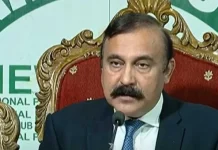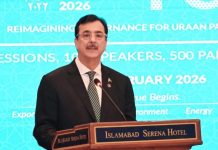

By Brig Syed Karrar Hussain Retired
Background and Importance of Celebrating German Unity Day
Every year on October 3, the people of Germany commemorate one of the most defining moments in their modern history — the Day of German Unity (Tag der Deutschen Einheit). The day marks the reunification of East and West Germany in 1990, a historic event that symbolized the triumph of democracy, human will, and national resilience over decades of division, oppression, and ideological rivalry during the Cold War.
After the Second World War, Germany was divided into four occupation zones under the control of the Allied powers — the United States, the Soviet Union, Britain, and France. This division evolved into two separate states in 1949: the Federal Republic of Germany (West Germany) and the German Democratic Republic (East Germany). The two countries stood as global symbols of the confrontation between capitalism and communism. The construction of the Berlin Wall in 1961 physically and emotionally cemented this division, separating families, friends, and fellow citizens for nearly three decades.
However, the spirit of unity and the desire for freedom could never be suppressed. In 1989, a series of peaceful demonstrations, supported by reformist movements across Eastern Europe, culminated in the fall of the Berlin Wall on November 9, 1989. Less than a year later, on October 3, 1990, East and West Germany were officially reunified. Since then, this day has been celebrated as German Unity Day, a national holiday that reminds Germans of the power of hope, peace, and persistence.
The day is not only about political unification but also about social integration and economic reconstruction. It commemorates the success of rebuilding a nation torn by ideology into one of the most advanced democracies and industrial powers in the world. It serves as a global symbol of reconciliation, showing that nations divided by conflict can find peace through dialogue and determination.
Achievements of the German Nation
Germany’s journey since reunification has been remarkable. Within a few decades, it transformed itself into the economic powerhouse of Europe and a leader in science, technology, and innovation.
1. Economic Transformation:
Germany boasts the largest economy in Europe and the fourth-largest in the world by nominal GDP. It is a model of industrial efficiency, fiscal discipline, and innovation. The “Made in Germany” brand is synonymous with quality, precision, and reliability. From the automotive giants like BMW, Mercedes-Benz, and Volkswagen to high-tech engineering and renewable energy solutions, Germany has maintained global competitiveness through research, training, and sustainable practices.
2. Social Stability and Democracy:
Germany’s democratic system, rooted in the principles of social justice and human rights, is a global example of political maturity. The Basic Law (Grundgesetz) ensures equality, civil liberties, and strong federal governance. The country’s post-reunification efforts to integrate the East German states socially and economically demonstrated an unparalleled national commitment to inclusivity and welfare.
3. Education and Innovation:
Germany has one of the world’s most advanced education and vocational training systems. Its universities are hubs of research and invention, particularly in the fields of engineering, medicine, and environmental science. The dual education system, combining academic learning with hands-on training, is globally admired and has produced a highly skilled workforce.
4. Environmental Leadership:
Germany is also a pioneer in renewable energy and climate policy. The “Energiewende” (energy transition) policy aims to shift the country toward clean energy sources. With significant investments in solar, wind, and biomass energy, Germany stands at the forefront of global environmental responsibility.
5. Global Humanitarian Role:
Germany’s responsible foreign policy, humanitarian aid programs, and peacekeeping contributions have strengthened its international reputation. It played a major role in the European Union’s expansion, refugee resettlement, and global climate agreements, embodying the spirit of cooperation and peace that German Unity Day celebrates.
Pakistan-German Relations: Trade, Diplomacy, Sports, and Defence
Pakistan and Germany enjoy a warm and multifaceted relationship that spans over seven decades. Diplomatic relations were established in 1951, and since then, both nations have nurtured cooperation in trade, development, education, and cultural exchange.
1. Trade and Economic Relations:
Germany is one of Pakistan’s largest trading partners in the European Union. The trade volume between the two countries exceeds €4 billion annually, reflecting mutual economic interest and trust. Pakistan’s major exports to Germany include textiles, garments, leather goods, and sports equipment, while Germany exports machinery, chemicals, vehicles, and industrial products to Pakistan.
Germany’s Generalized System of Preferences Plus (GSP+) status for Pakistan under the European Union framework has allowed Pakistani goods duty-free access to EU markets, greatly boosting exports. German companies such as Siemens, Bayer, and Mercedes-Benz have long-standing operations and investments in Pakistan, contributing to technology transfer and job creation.
Moreover, Pakistan’s growing IT sector and renewable energy potential offer vast opportunities for German investment. Joint ventures in solar energy, green technologies, and engineering could significantly strengthen future trade cooperation.
2. Diplomatic and Development Cooperation:
Germany has been a steadfast development partner for Pakistan through its agencies like GIZ (German Agency for International Cooperation) and KfW Development Bank. These institutions have supported Pakistan in renewable energy, vocational training, climate resilience, and governance reforms.
Culturally, institutions such as the Goethe-Institut in Karachi have promoted German language education and cultural exchange. German scholarships through the DAAD (German Academic Exchange Service) have enabled thousands of Pakistani students to pursue higher studies in German universities, building intellectual and professional bridges between the two nations.
3. Sports and Cultural Ties:
Germany is renowned for its sports excellence, particularly in football, and there has been growing cooperation with Pakistan’s sports industry. Pakistan’s city of Sialkot, the global hub for sports goods manufacturing, produces millions of footballs annually — including those used in FIFA World Cups — for German and other international brands. This collaboration highlights Pakistan’s craftsmanship and Germany’s trust in Pakistani industries.
Cultural collaboration between artists, writers, and educational institutions has also enriched people-to-people contact. Joint exhibitions, film festivals, and literary exchanges continue to foster mutual understanding and respect.
4. Defence and Strategic Cooperation:
Though modest compared to economic ties, defence and security cooperation between Pakistan and Germany has remained constructive. Germany has provided training to Pakistani officers in peacekeeping and strategic studies, and both nations collaborate through multilateral platforms such as the United Nations.
Germany’s advocacy for global disarmament, peacekeeping, and stability resonates well with Pakistan’s own vision of regional peace and balanced diplomacy. Regular dialogue on counterterrorism, climate security, and global peace missions underscores the depth of understanding between both countries.
Recommendations to Further Strengthen Bilateral Relations
As the world faces complex challenges — from climate change and energy crises to global inequality and technological transformation — there is tremendous potential for Pakistan and Germany to deepen cooperation. The following recommendations may serve as a roadmap for future engagement:
1. Enhancing Trade Diversification:
Both nations should explore new trade sectors beyond textiles and machinery, such as renewable energy equipment, pharmaceuticals, and digital technology. Pakistan’s strategic location and its role in the China-Pakistan Economic Corridor (CPEC) can attract German investors seeking access to South Asian and Central Asian markets.
2. Expanding Educational Partnerships:
Joint research programs and academic exchanges can be expanded to include climate science, green engineering, and digital innovation. Establishing more German language and cultural centers in Pakistan would encourage greater youth interaction and mutual understanding.
3. Strengthening Green Cooperation:
Germany’s expertise in renewable energy aligns perfectly with Pakistan’s urgent need for sustainable power solutions. Collaborations in solar and wind energy, waste management, and water conservation could serve both environmental and economic interests.
4. Promoting Tourism and Cultural Diplomacy:
Pakistan’s natural beauty, cultural heritage, and historical sites can attract German tourists, while Germany’s museums and art festivals can host Pakistani artists. Tourism exchange programs and direct flight connectivity would enhance people-to-people relations and cultural appreciation.
5. Security and Defence Collaboration:
Germany can assist Pakistan in enhancing its cybersecurity infrastructure, counterterrorism capabilities, and peacekeeping training. Regular strategic dialogues between defence institutions will ensure mutual trust and learning.
6. Building Business-to-Business Networks:
Chambers of commerce and trade forums in both countries should organize annual investment conferences. Pakistan’s growing startup ecosystem and Germany’s technological expertise can combine to create new avenues in digital entrepreneurship.
7. Joint Humanitarian and Global Peace Efforts:
Pakistan and Germany, both strong advocates of international peace and humanitarian assistance, can collaborate through UN peacekeeping missions and climate adaptation projects in developing regions. This would not only enhance bilateral goodwill but also project both nations as partners in global stability.
Conclusion
German Unity Day stands as a monument to perseverance, peace, and human unity. The reunification of Germany was not merely a political event; it was the rebirth of a nation built on the ideals of liberty, justice, and progress. For the world, it remains a message of hope — that barriers can fall, nations can heal, and divided hearts can unite through courage and vision.
Pakistan and Germany, bound by decades of friendship and mutual respect, have immense potential to elevate their relationship to new heights. By expanding cooperation in trade, education, renewable energy, and cultural understanding, the two nations can together contribute to a more peaceful, prosperous, and sustainable world.
Just as Germany emerged stronger from its past divisions, Pakistan too continues its journey of resilience and reform. In this shared spirit of unity and determination, German Unity Day offers both nations a reminder — that progress is built not by isolation, but through partnership, understanding, and unwavering faith in the power of human unity.
























